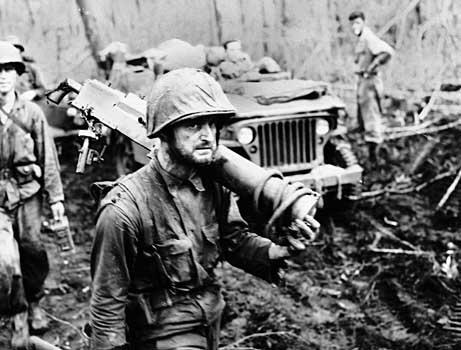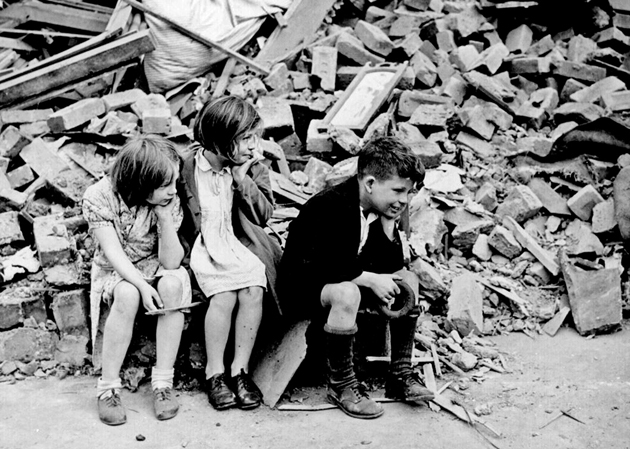The World at War - The Ultimate Restored Edition


Originally released in 1973, The World
at War remains the definitive exploration of the war which claimed
more than 60 million casualties, forever changing both the borders of
Europe and the lives of the people dwelling within them.
Comprising 26 hour-long episodes on all
aspects of the hostilities that took place in Europe, Africa and across
the Pacific, this landmark Thames Television series still remains the
preeminent documentary series about World War II, offering unparalleled
insights into the bloodiest conflict of human history and providing an
all-encompassing overview of the war, including its genesis and
aftermath.

Newly remastered, fully restored and
featuring all-new packaging, Roadshow’s 11-disc box set will be
available on Australian shores as of August 4. It comprises the series
in its entirety, as well as over 12 hours’ worth of bonus features, new
widescreen transfers, a surround soundtrack, subtitles, a 12-page
booklet and much more. The full episode list is as follows:
A New Germany
(1933–1939)
The rebirth of Germany and growth in power
of the NAZI Party leading up to the outbreak of war.
Distant War
(September 1939 – May 1940)
The
invasions of
Poland, the
Winter War,
the sinking of the
Graf Spee,
the "phony
war" and failure in
Norway
and the elevation of
Winston Churchill
to Prime Minister.
France Falls
(May – June 1940)
French politics, the
Maginot Line,
Blitzkrieg
warfare, and the
Nazi invasion of
France and the
Low Countries.
Alone (May 1940 – May 1941)
The
Battle of Britain,
retreats in
Greece,
Crete
and
Tobruk,
and life in Britain between the
evacuation at
Dunkirk and
Operation
Barbarossa.
Barbarossa
(June – December 1941)
After dominating southeastern Europe
through force or intrigue, Germany begins the massive invasion of
Soviet Union.
Despite several quick victories, the invasion ultimately stalls after a
failed
assault on Moscow
during Russia's harsh winter.
Banzai! Japan (1931–1942)
The rise of the Japanese Empire, the
Sino-Japanese war,
Pearl Harbor
and the early Japanese successes, and the
fall of Malaya
and
of Singapore.
On Our Way: U.S.A. (1939–1942)
The opposition by various factions to the
United States of America entry into the war, U-boat attacks on Atlantic
convoys and America's gradiated responses, the mobilization of America
after Pearl Harbor, the loss of the Philippines, the
Doolittle Raid,
Midway
and
Guadalcanal.
The Desert: North Africa (1940–1943)
The desert war,
starting with Italy's unsuccessful invasion of Egypt and the successive
attacks and counter-attacks between Germany and Commonwealth forces, and
the
Afrika Korps'
eventual defeat at
El Alamein.
Stalingrad (June 1942 – February
1943)
The mid-war German situation in Southern
Russia resulting in the
Battle of
Stalingrad – and its ultimate German catastrophe.
Wolf Pack: U-Boats in the Atlantic
(1939–1943)
The
submarine
war emphasizing mainly the North Atlantic. Tracks the development of
both the convoy system and German submarine strategy. Interviewees
include Grand Admiral
Karl Dönitz
and
Otto Kretschmer.
Red Star: The Soviet Union
(1941–1943)
The rise of the
Red Army,
mobilisation of Soviet production, the
siege of
Leningrad, the
Soviet partisans
and the
Battle of Kursk.
Whirlwind: Bombing Germany
(September 1939 – April 1944)
The development of British and American
strategic bombing
in both success and setback.
Tough Old Gut: Italy (November 1942
– June 1944)
Emphasizes the difficult
Italian Campaign
beginning with
Operation Torch
in North Africa, the
invasion of
Sicily;
Salerno,
Anzio,
Cassino;
and the capture of Rome.
It's A Lovely Day Tomorrow: Burma
(1942–1944)
The jungle war in
Burma
and
India
- what it "lacked in scale was made up in savagery".
Home Fires: Britain (1940–1944)
Life and politics in Britain from
post-Battle of Britain to the first
V-1
attacks.
Inside the Reich: Germany
(1940–1944)
An exploration of German society and daily
life, and how it changed as the fortunes of war were reversed.
Censorship and popular entertainment, the transformation of German
industry, the recruitment of female and foreign labour, allied bombing,
German dissent - including the
20 July plot,
and the mobilisation of the
Volkssturm
towards the war's end. Interviewees include
Albert Speer,
Otto John,
Traudl Junge,
Richard Schulze-Kossens,
and
Otto Ernst Remer.
Morning: (June – August 1944)
The development and execution of
Operation
Overlord followed by the allied breakout and battles at
Bocage,
and
Falaise.
Occupation: Holland (1940–1944)
Emphasizes life in the
Netherlands
with German occupation, when citizens chose to resist, collaborate or
remain passive.
Pincers (August 1944 – March 1945)
The allied breakout in France and the
failure of
Operation Market
Garden, the
Warsaw Uprising,
the
Battle of the
Bulge, and the crossing of the Rhine.
Genocide
(1941–1945)
Begins with the founding of the
S.S.
and follows the development of Nazi racial theory. It ends with the
implementation of the
Final Solution.
Nemesis: Germany (February –
May 1945)
The final invasion of Germany by both the
Western and Eastern allies, the bombing of Dresden, and the events in
the
Führerbunker.
Interviewees include
Albert Speer,
Traudl Junge
and
Heinz Linge.
Japan (1941–1945)
Japan's society and culture during wartime,
and how life is transformed as the country gradually becomes aware of
increasingly catastrophic setbacks including the
Doolittle raid,
defeat at
Midway,
the death of
Isoroku Yamamoto, the
Battle of Saipan,
Okinawa
and the relentless
bombing of
Japanese cities.
Pacific (February 1942 – July 1945)
The successive and increasingly bloody land
battles on tiny islands in the expansive Pacific, aimed towards the
Japanese heartland. Following the
bombing of Darwin,
the over-extended Japanese are progressively turned back at
Kokoda,
Tarawa,
Peleliu,
the
Philippines,
Iwo Jima
and finally
Okinawa.
The Bomb (February –
September 1945)
The
development of
the atomic bomb, the ascendency of President
Harry Truman,
emerging splits in the Allies with
Joseph Stalin,
and the
atomic bombings
of Hiroshima and Nagasaki, ultimately leading to the
surrender of
Japan. Interviewees include
Toshikazu Kase,
Yoshio Kodama,
Marquis Koichi
Kido, Major General
Charles Sweeney,
Brigadier General
Paul Tibbets,
Alger Hiss,
W. Averell
Harriman,
Lord Avon,
McGeorge Bundy,
John J. McCloy,
General
Curtis LeMay
and
Hisatsune
Sakomizu.
Reckoning (April 1945)
The situation in post-war Europe including
the allied
occupation of
Germany,
demobilisation,
the
Nuremberg Trials
and the genesis of the
Cold War.
The episode concludes with summations about the ultimate costs and
consequences of the war.
Remember
How the war was experienced and remembered
by its witnesses.
Audio & Video
The new anamorphically enhanced widescreen
transfer is pretty close to faultless, especially considering the age of
some of the material. Maps, graphics and interview footage are devoid
of any grain or artefacts, and the period footage has been expertly
sourced and rendered as cleanly and crisply as possible. The Ultimate
Restored Edition also features 2.0 and 5.1 surround audio options; both
are respectable, though the 5.1 is naturally the more balanced and
resonant of the two. All content on all 11 discs has been remastered
and restored, and the series itself and the bonus features alike boast
5.1 surround sound and English subtitles for the hearing impaired.
Special Features
Included among the 3 discs of bonus
material are a number of documentaries and extended featurettes,
including a contemporary Making Of filmed shortly after the series was
first broadcast, a 2-hour extended retrospective incorporating
interviews with the makers of the original program and a comprehensive
exploration of the entire restoration process from start to finish.
Of particular note amongst the original
content are an extended interview with Hitler’s secretary Traudl Junge,
a harrowing 2-part documentary on the Final Solution which comprises the
entirety of Disc 10, movie-length features on daily life in Hitler’s
Germany both during the pre-war years 1933-1938 and from 1939-1945, and
a featurette simply entitled ‘Warrior’ which explores the deadly,
distinctly unglamorous realities of warfare through archival footage,
eyewitness accounts and interviews with survivors of the front lines.
Also included are biographies of some of the key lives of the period, a
brief written history of The World at War, episode summaries,
speeches and songs, interviews with eminent historians and scholars such
as Stephen Ambrose, newsreels, maps and an Imperial War Museum photo
gallery.
Summary
Well worth its $89.95 RRP and an
indispensible resource for dabblers and devotees alike, The World at
War still stands as the most authoritative and
exhaustively-researched television series to date on World War II, a
distinction that has now remained unchallenged for the better part of
four decades. The packing and presentation are first-rate, the bonus
features enthralling and the series itself largely unparalleled - for
armchair military historians it really doesn’t come much better than
this.